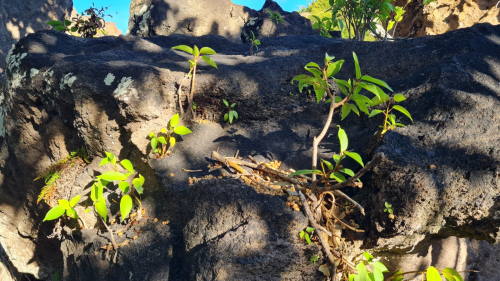 SABA:--- Through the continued efforts of the NEPP (Nature and Environment Policy Plan) team and its key stakeholders, the island has seen progress in reducing erosion and facilitating vegetation recovery.
SABA:--- Through the continued efforts of the NEPP (Nature and Environment Policy Plan) team and its key stakeholders, the island has seen progress in reducing erosion and facilitating vegetation recovery.
This has been observed in areas such as Giles Quarter, where tree saplings are emerging, mitigating future erosion. In the past, trees that sprouted in this area were typically unable to develop due to the overgrazing of vegetation caused by free-roaming livestock, mainly goats. With these saplings showing signs of remaining intact, these trees will not only assist in stabilizing the soil and preventing landslides but also help prepare Saba for the impacts of climate change. It is critical that these young trees are given the opportunity to grow and form part of Saba’s forests. The same can be said about the overall spread of grasses and shrubs that have been observed on the hillsides all over the island.
As the vegetation regrows, we will begin seeing a reduction in rockfalls and landslides. This reduction improves the safety of our residents and infrastructure and benefits our marine ecosystems. Erosion caused by both natural elements and the movement of free-roaming livestock leads to loose sediment being washed into the ocean, suffocating coral reefs. This sedimentation also blocks sunlight, which inhibits coral growth. By reducing erosion, we are helping to prevent coral death. To accelerate the recovery of vegetation, a reforestation program is being implemented that focuses on the planting of trees in erosion-prone areas. Outplanting will start at the end of the month at the Corner' along Fort Bay Road.
To maintain and continue the progress in erosion reduction, addressing the island’s goat population remains essential. Despite seeing lower numbers of goats in residential areas, many still hide in gullies or cliffs and continue to have a negative impact on the landscape. Due to the high reproduction rate of goats (a goat population not hampered by predation can double in size in around a year and a half), it is of great necessity to remove the remaining ones to ensure the continued recovery of Saba’s native vegetation. Without strong population control, the island risks seeing a resurgence in the goat population, which could undo the progress made over the past years. This is why the Public Entity has obtained the assistance of invasive species experts. These experts will also assist with the control of non-native iguana populations to protect Saba’s native Black Iguana. Additionally, efforts will be made together with the invasive species experts and the Saba Conservation Foundation to remove feral cats and rats around nesting sites of red-billed tropic birds. By doing this, we can protect Saba’s breeding colony, which is of ecological significance for the entire population of this bird species worldwide. These combined efforts will facilitate nature and habitat recovery and safeguard biodiversity.
End of Bounty Program
The bounty program for the removal of free-roaming livestock will end on January 31st, 2025.
Since its implementation in early 2022, the bounty system has seen active participation from local hunters in the livestock control project, resulting in a significant decrease in the free-roaming livestock population. The project has now moved to a new phase where stricter management of the remaining goat population is needed. This involves the use of specialized methods to address the remaining animals that may be in difficult-to-reach areas. The invasive species experts, equipped with drones, heat sensors, and other advanced gear, work in collaboration with the government hunter.
Although the bounty program is ending, people on Saba with a valid gun license may continue hunting free-roaming livestock.
Please note that after Friday, January 31, 2025, no further requests for bounty payments will be accepted.
Responsible Animal Husbandry
While PES continues to promote the well-being of our environment through various initiatives, we also remind the public of the various ways in which responsible animal husbandry and backyard farming are promoted. Considering the importance of local food security, the Public Entity aims to increase the local production of healthy crops and quality animal products. This is done, among other things, via a subsidy program to cover costs for the import of animal feed and distribution of fruit trees and seeds.
Additional initiatives are being developed as part of an ongoing food security program under the Nature and Environmental Policy Plan. With the combined efforts on invasive species control, targeted reforestation, and food security initiatives, the Public Entity aims to facilitate overall nature recovery and biodiversity restoration, as well as the sustainable use of ecosystem services. This will help preserve Saba’s unique ecosystems in the long term and make the island more resilient against the influence of climate change in the future.
For questions with regards to the end of the bounty program, please reach out to the Public Entity via This email address is being protected from spambots. You need JavaScript enabled to view it..









